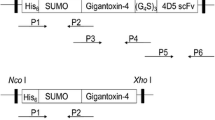Summary
We coupled monoclonal IgMk antibodies directed against human breast carcinoma cells to the A-chain of the plant toxin ricin. These molecular hybrids maintain both their antibody-binding activity and the toxic activity of the A-chain. Thus, they specifically bind to and kill the breast carcinoma cells in vitro.
Similar content being viewed by others
References
Blythman HE, Casellas P, Gros O, Jansen P, Paulucci FK, Pau F, Vidal H (1980) Immunotoxins: Hybrid molecules of monoclonal antibodies and a toxin subunit specifically kills tumor cells. Nature 290:145
Carlsson J, Drevin H, Axen R (1978) Protein thiolation and reversible protein-protein conjugation. N-succinimidyl 3-(2-pyridyldithio) propionate, a new heterobifunctional reagent. Biochem J 173:723
Engel LW, Young NA, Tralka TS, Lippman ME, O'Brien SJ, Joyce MJ (1978) Establishment and characterization of three new continuous cell lines derived from human breast carcinomas. Cancer Res 38:3352
Gilliland DG, Steplewski Z, Collier RJ, Mitchell KF, Chang TH, Koprowski H (1980) Antibody-directed cytotoxic agents: Use of monoclonal antibody to direct the action of toxin A-chains to colorectal carcinoma cells. Proc Natl Acad Sci USA 77:4539
Isakson PC, Krolick KA, Uhr JW, Vitetta ES (1980) The effect of anti-immunoglobulin antibodies on the in vitro proliferation and differentiation of normal and neoplastic murine B cells. J Immunol 125:886
Keydar I, Chen L, Karby S, Weiss FR, Delarea J, Radu M, Chaitcik S, Brennar HJ (1979) Establishment and characterization of cell line of human breast carcinoma origin. Eur J Cancer 15:659
Krolick KA, Villemez C, Isakson P, Uhr JW, Vitetta ES (1980) Selective killing of normal and neoplastic B cells by antibodies coupled to the A chain of ricin. Proc Natl Acad Sci USA 77:5419
Loor F (1977) Structure and dynamics of the lymphocyte surface in relation to differentiation, recognition and activation. Prog Allergy 23:1–153
Masuho Y, Hara T, Noguchi T (1979) Preparation of a hybrid of fragment Fab' of antibody and fragment A of diphtheria toxin and its cytotoxicity. Biochem Biophys Res Commun 90:320
Olsnes S, Pihl A (1976) The specificity and action of animal, bacterial and plant toxins. In: Cuatrecases P (ed) Receptors and recognition: series B, vol 1. Abrin, ricin and their associated agglutinins. Chapman and Hall, London, pp 130–173
Raso V, Griffin T (1980) Specific cytotoxicity of a human immunoglobulin directed Fab'-ricin A-chain conjugate. J Immunol 125:2610
Segal GP, Klinman NR (1976) Defining the heterogeneity of anti-tumor antibody responses. J Immunol 116:1539
Svasti Y, Milstein C (1972) The complete amino acid sequence of a mouse K light chain. Biochem J 128:427
Youle RJ, Neville DM (1980) Anti-Thy 1.2 monoclonal antibody linked to ricin is a potent cell-type-specific toxin. Proc Natl Acad Sci USA 77:5483
Author information
Authors and Affiliations
Rights and permissions
About this article
Cite this article
Krolick, K.A., Yuan, D. & Vitetta, E.S. Specific killing of a human breast carcinoma cell line by a monoclonal antibody coupled to the A-chain of ricin. Cancer Immunol Immunother 12, 39–41 (1981). https://doi.org/10.1007/BF00200310
Received:
Accepted:
Issue Date:
DOI: https://doi.org/10.1007/BF00200310




